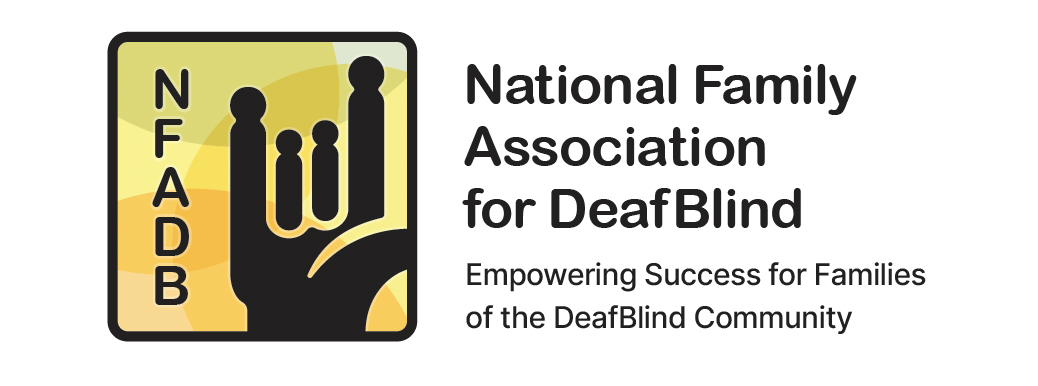Our National Advocacy Agenda recognizes that we need to "tweak" the existing definition in IDEA, We pointed to this definition in the Cogswell-Macy Act, but maybe we should consider other definitions. The objective is to ensure that our children are properly identified in the child count, which determines allocation of funds to our state Deaf-Blind projects.
Why is this so important?
The US Department of Education (ED) is required by the Individuals with Disabilities Education Act (IDEA) to report to Congress annually on the number of children receiving special education, by disability category, for ages 3-21 years. The count must be unduplicated – that is, children can only be counted in one category, regardless of the number of disabilities they experience.
For this count, the primary ranking is the only one reported to the federal government for IDEA data collection. Therefore, unless the Deafblind label is stated as the primary disability it will not be recorded on this count. This information is used in policy development. Since deafblindness is the rarest of the low incidence groups, it is important to be sure they are not missed. Policy makers may not see the separate Deafblind Child Count with information collected by state deafblind projects and compiled by the National Center on Deaf-Blindness.
Here's a few definitions used by various sources across the world of Deaf-Blind:
From The Helen Keller Act - US CODE, TITLE 29 – LABOR, CHAPTER 21 - Sec. 1905
(1) the terms ''Helen Keller National Center for Youths and Adults who are Deaf-Blind'' and ''Center'' mean the Helen Keller National Center for Youths and Adults who are Deaf-Blind, and its affiliated network, operated pursuant to this chapter;
(2) the term ''individual who is deaf-blind'' means any individual -
(A) (i) who has a central visual acuity of 20/200 or less in the better eye with corrective lenses, or a field defect such that the peripheral diameter of visual field subtends an angular distance no greater than 20 degrees, or a progressive visual loss having a prognosis leading to one or both these conditions;
(ii) who has a chronic hearing impairment so severe that most speech cannot be understood with optimum amplification, or a progressive hearing loss having a prognosis leading to this condition; and
(iii) for whom the combination of impairments described in clauses (i) and (ii) cause extreme difficulty in attaining independence in daily life activities, achieving psychosocial adjustment, or obtaining a vocation;
(B) who despite the inability to be measured accurately for hearing and vision loss due to cognitive or behavioral constraints, or both, can be determined through functional and performance assessment to have severe hearing and visual disabilities that cause extreme difficulty in attaining independence in daily life activities, achieving psychosocial adjustment, or obtaining vocational objectives; or
(C) meets such other requirements as the Secretary may prescribe by regulation; and
(3) the term ''Secretary'' means the Secretary of Education.
Source
National Health Service (UK)
Deafblindness is a combination of sight and hearing loss that affects a person's ability to communicate, access information and get around. It's also sometimes called "dual sensory loss" or "multi-sensory impairment". A deafblind person won't usually be totally deaf and totally blind, but both senses will be reduced enough to cause significant difficulties in everyday life. https://www.nhs.uk/conditions/deafblindness/
Nordic Definition of Deafblindness
“Deafblindness is a combined vision and hearing impairment of such severity that
it is hard for the impaired senses to compensate for each other. Thus, deafblindness is a distinct disability." The linked document goes on to describe how deaf-blindness impacts functioning.
https://nordicwelfare.org/wp-content/uploads/2018/03/nordic-definition-of-deafblindness.pdf
World Federation of Deafblind
"WFDB defines deafblindness as a distinct disability arising from a dual sensory impairment of a severity that makes it hard for the impaired senses to compensate for each other. In interaction with barriers in the environment, it affects social life, communication, access to information, orientation and mobility. Enabling inclusion and participation requires accessibility measures and access to specific support services, such as interpreter-guides, among others." Source: World Federation of the Deafblind. (2018). At risk of exclusion from CRPD and SDGs implementation: inequality and persons with deafblindness. Initial global report on situation and rights of persons with deafblindness. http://www.wfdb.eu/wp-content/uploads/2019/04/WFDB-global-report-2018.pdf
Deafblind International
Deafblindness involves varying combinations of visual and hearing impairment to such an extent that neither the vision nor hearing can be employed as a means of accessing information, communication, and participation in society (Deafblind International, 1999). Cited in: Minhas, R., Jaiswal, A., Chan, S., Trevisan, J., Paramasivam, A., & Spruyt-Rocks, R. (2022). Prevalence of Individuals with Deafblindness and Age-Related Dual-Sensory Loss. Journal of Visual Impairment & Blindness, 116(1), 36-47.
Please share your state's definition of DeafBlind and let us know if you have a preferred definition.

